How to Use Psychology in Your Brand Strategy to Create Irresistible Brand Experiences and Increase Sales
Have you ever bought something you thought you really needed and it turned out you didn’t? Impulse purchases are common phenomena but rarely do people realized that it’s not them to blame, but the clever marketers and their brand strategy tactics.
Psychology has been used by marketers for years as a core factor within their brand strategy, and each time it’s getting harder and harder to decipher the weed from the chaff, simply because you can’t control your brain.
So if others are using psychology to drive results, why can’t you use it in your brand strategy too?
This article is intended to explore the science behind common psychology principles used in branding and marketing. We’ll also explore why and how the principles work and look at ethical issues that may arise.
To make your brand truly speak to your audience, psychology and empathy have to be built into the core of your brand. The Persona Brand Building Blueprint™ Mastermind creates a clear process for you to influence customer choice within your brand strategy. You can learn how to infuse your brand with a strong emotional appeal, tap into people’s subconsciousness and create an irresistible bond between your brand and your customers so you increase your sales.
Want to discover more about building your standout, №1 powerhouse brand using brand psychology?
- Schedule an appointment — we can meet in person or online
- Allow us to create a customised plan for you
- Let’s implement the plan together
- Get in touch [email protected] or ring +353 1 8322724
The Science Behind Emotional Brand Strategy
Numerous studies have shown that people buy feelings and experiences, not things. When you see a cute puppy, certain hormones fill your brain and you become loving and affectionate. You don’t care about the exact hormone process in your brain, but the puppy certainly makes you feel good.
Here are the two videos that prove the point. The speakers (Tony Robbins and Aaron Ross) talk about education and positive feelings as the two drivers of sales:
Outlining how the product solves the problem has little effect on people. Creating a picture of a happy, stress-free life has a far more profound effect.
So why do emotions work so well? The powerful effect that emotions have can be explained by psychological associations. We learn by assigning emotional value to things. Touch a cactus needle and you’ll get a painful scratch. Next time you see the cactus, you won’t be so eager to touch its needles. These psychological memories[1] get stored in our brain so that we can avoid the danger the next time.
Unfortunately, they are stored so deeply in our unconscious minds that we lose the power over our reactions.
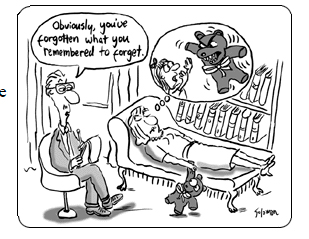
Image via columbia.edu
Knowing your audience well and creating these associations as part of your brand strategy gives you an unprecedented advantage over your competitors. Customers are as prone to brand messages as they are to the messages from the outside world. You can create associations through constant communication and wonderful experiences and make a person feel happy or sad whenever he or she buys your product.
Overwhelmed by the ever-increasing market demands in building a successful brand?
Depending on your preferences and state of growth, we have the perfect solution for you — so if you want us to:
- Build your brand for you – find out more here or get in touch [email protected] or ring +353 1 8322724
- Empower you to build your brand – check out thePersona Brand Building Blueprint™ Mastermind here. This is a two-day intensive where you work on your brand with us codifying and mapping out your brand strategy for business growth. Alternatively, join our half-dayBranding Accelerator Masterclass for a fast-injection of brand building essentials. We also have a dedicated Personal Brand and Corporate Brand Alignment Masterclass
- Want a DIY solution? Check out our how to build a brand eprogramme here because it empowers you to build your brand yourself so you become No.1 in your market and increase your profits
For example, when Coca-Cola’s marketing team featured Santa Claus in their TV ads they created a strong Christmas association – suddenly, we all needed a Coca-Cola signature beverage on our tables to feel warm and happy. Coca-Cola’s sales soared and continue to rise ever since.
Related: Christmas Branding: Top 10 Tips to Infuse Your Brand with Seasonal Spirit
But how do you create associations within your brand strategy? Let’s look at psychological principles that describe what people respond to.
7 Emotional Psychological Principles Used In Brand Strategy
These psychological principles were identified by the professor of psychology and marketing, Robert Cialdini, in his book Influence: The Psychology of Persuasion.[2] Anyone who has a business and sells products or services should learn these principles.
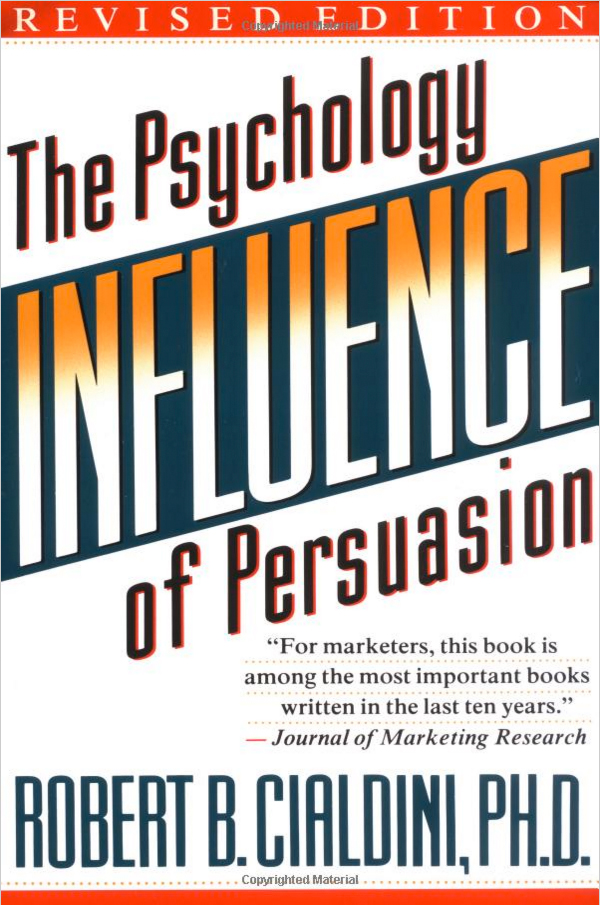
Image via Amazon
These principles are more of concepts rather than direct methods, so you need to know how to apply them. But don’t worry, we’ve included some case studies to show how these psychological principles work and to spark up your brand strategy creativity.
Reciprocity in Brand Strategy
Reciprocity refers to a psychological association that inspires us to give back. When someone gives us something we feel compelled to return the favour. It’s a powerful principle that keeps societies and businesses human.
Starbucks employs the reciprocity principle with their “Free Refills” campaign. Even though they are not giving the product, but are asking you to buy first, they do give you a promise of a future benefit. This is a perfect example of the reciprocity principle in action.
Related: Brand Promises: How to Craft, Articulate and Live Them for Brand Success
Reciprocity principle stands behind the whole concept of content marketing too. When you have an active blog and provide readers with valuable educational information on a regular basis, they will feel compelled to try your service or buy your product at some stage.
Commitment in Brand Strategy
People will try to do everything to prove they’re trustworthy. Even though this might sound too idealistic, most people genuinely care about their reputation and will go to great lengths to show that their actions follow their words.
Once you take a small step, it is easier to move forward. This is why when you prepare your New Year’s resolution list, it’s best to share it with your friends and family.
This principle finds its application in numerous branding and marketing campaigns.
Take a look at Westerly Natural Market website – the brand offers you to join the weekly mailing list for a $5 coupon. Entering your email into a tiny field is the first step towards commitment.

Image via Westerly Natural Market
Social Proof in Brand Strategy
The social proof principle states that when we see someone else liking a service or product we feel an incredible desire to try it. We’re social creatures after all, and in a world overloaded with information, word of mouth is as good of an indicator of trustworthiness as everything else.
The social proof principle has plenty of applications, from quoting your customers to featuring star ratings on the website and showing the view count on every blog post.
Sonaa brand dedicated a whole website section to testimonials. Testimonials in SME/SMB service business are extremely important because there are typically limited ways for customers to check the quality of the service or product before they buy it. Testimonials also reinforce the personal connections that small businesses have with their customers.
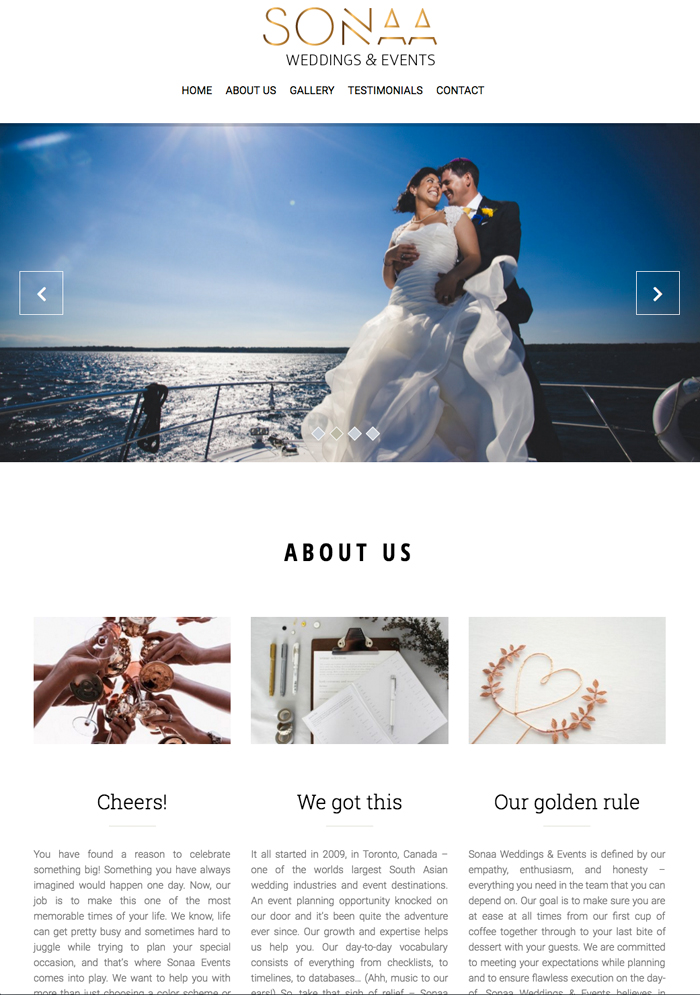
Image via Sonaa
Numbers have the same effect on people as customer reviews. Put a clear text indication of how many people read your blog, and you’ll gain new readers in no time.
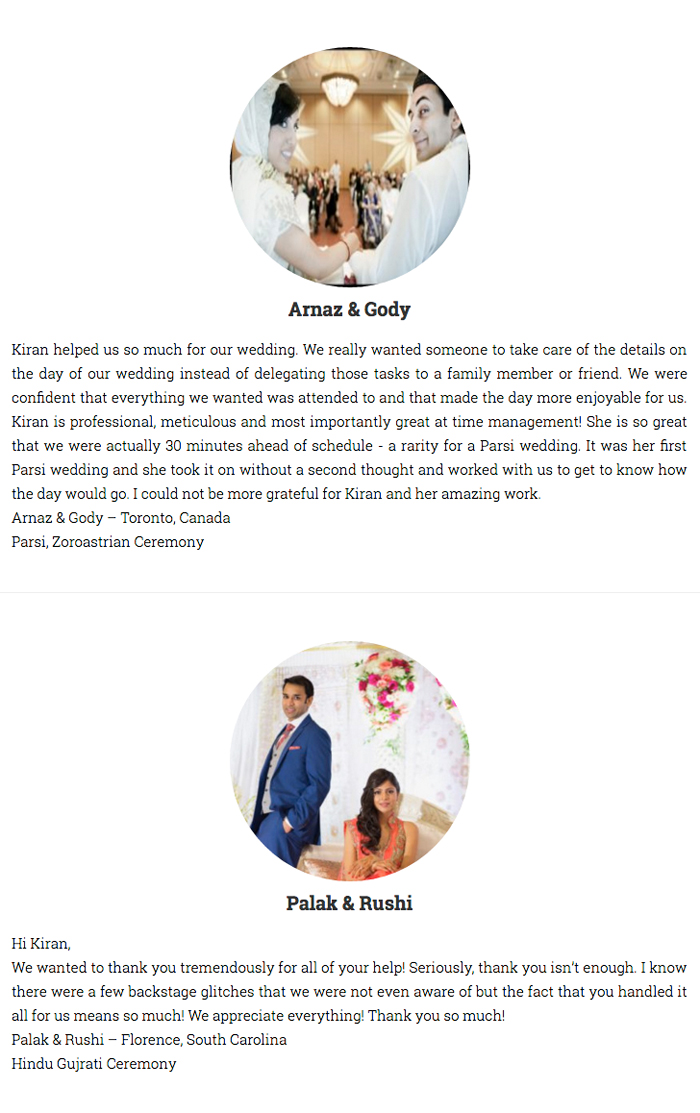
Image via Sonaa
Authority in Brand Strategy
We’re hardwired to respect authority. Whether it’s our parents or teachers, we learn to listen to figures of authorities from the very early childhood. And we rarely question what they say, rather we take everything at face value.
A figure of authority can be an Instagram star, a political leader or a representative of an old respectable profession. Look at how Pfizer uses doctors to advocate for the brand:
The doctor in the video gave the valuable information but hasn’t explicitly advertised the product. Yet, the association was created in the viewers’ minds, making Pfizer seem more knowledgeable and caring.
Liking in Brand Strategy
The principle of liking states that if we’re emotionally connected to a person it’s easier for us to accept the offer. There is no doubt, that when faced with a similar request from a friend and a total stranger, we will most likely help our friend.
Personal connection in the branding world is a bit harder to pull off, but it’s still possible. Brad Pitt, Angelina Jolie, Scarlett Johansson, have all been brand ambassadors. They are loved by their fans and the fans are eager to believe that everything these celebrities sell is worth the price. Personal branding works the same way – you connect with a real person and then start liking their business or product.
Related: Personal Branding: We Are All CEOs (Part 1)
The principle of liking has a wide application. As a small business, you probably can’t hire Angelina Jolie, but it’s a proven fact that we experience strong emotions when facing the pictures of kids and puppies.
Here is how Uptownpuppies designed their homepage. They could feature an adult dog in the picture or state some facts about the breed, yet we’re looking at the picture of two cute puppies. Moreover, the brand emphasizes the appeal of the dogs but featuring an emotional tagline “More Fun. More Love. More Life”.
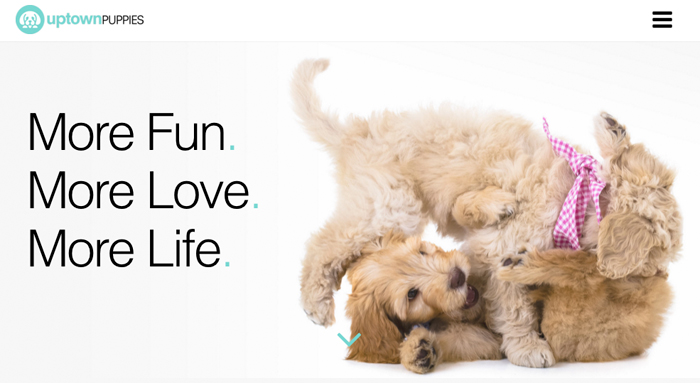
Image via Uptownpuppies
Making your brand likeable has a lot to do with emotions. The Persona Brand Building Blueprint™ Mastermind will show you how to use emotional triggers to create customer recognition and trust, build long-term relationships with your customers and positively affect your bottom line.
For brands that are willing to embark on the brand transformation journey, but want a self-help solution, take a look at the Personality Profile Performer™ Programme here. It’s a step-by-step process empowering you to build your highly recognised brand so you can grow your business and increase your profits.

Build your standout, highly likeable brand here with Lorraine Carter
Scarcity in Brand Strategy
People love Sales. Yes, the prices are lower but also sales don’t last too long. Scarcity principles states that we are more likely to buy if we believe there is something to lose.
Those countdown to sales messages you saw in your emails, or headlines screaming “OFFER ENDS SOON” – all tap into the power of scarcity.
Some brands are more creative than others and come up with elaborate scarcity based strategies. When Snapchat launched their Snapchat Spectacles, the glasses had a limited availability in selected cities. Moreover, Snapchat shared pictures of long lines in front of the vending machines on social media and thus generated more interest.

Image via Techcrunch
Priming in Brand Strategy
The seventh Cialdini principle was described in his second book Pre-Suasion: A Revolutionary Way to Influence and Persuade[3]. The principle states that we are predisposed to accept the information we’ve heard or seen before. This is a powerful principle, that a lot of marketers and salespeople use when meeting a customer for the first time.
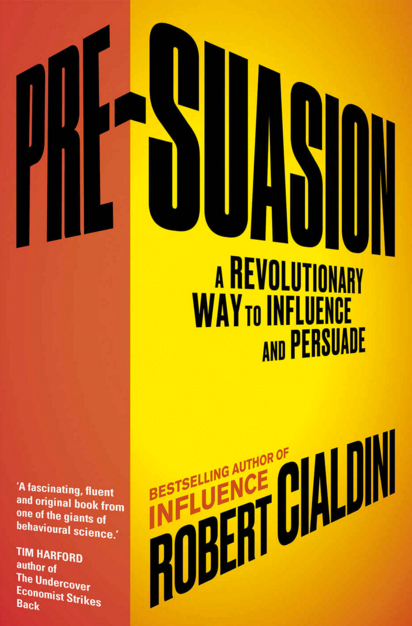
Image via Amazon
Once you say yes it’s hard to say no. For example, when you’re approaching a stand at the airport, the company representative might ask you “Do you travel often?” and then offer you to take a part in the survey. Studies show that after stating a positive answer, a greater percentage of people agree to participate in the survey.
This principle has been confirmed by numerous studies[4], including the one by Hermann von Helmholtz, who proved that the brain completes the missing information from the past knowledge and constructs its own view of the environment.
This video from Ted-Ed confirms the point:
Now let’s look at some principles that employ our senses:
3 Sensual Psychological Principles Used In Brand Strategy
Colour in Brand Strategy
Colour has long been used as an aspect of influence. Here is the recent post on the role of colour in branding. But colour doesn’t only affect our decisions in the moment but also prepares us for the right decisions.
Related: Colour Psychology: Cracking the Colour Code for Profitable Branding
In the study conducted by Naomi Mandel and Eric J. Johnson[5], consumers were presented with two websites with different backgrounds. The visitors who have been presented a website with a blue background and soft white clouds looked at the information related to comfort longer. This example can have significant implications for businesses operating in the mattress industry. And any business in general, as long as you identify the background colour that works for your brand and it’s psychological principles. It’s important to evaluate the colours your target audience are most positively predisposed towards along with their age profile, gender, cultural influences and so forth.
The most famous brands know the power of colour and use it extensively. Look at this recent experiment[6] conducted by the signage firm. People in the study were asked to draw 10 famous logos from memory. While there were plenty of absolutely hilarious logos, that missed the point completely, the majority of people got the colours right.
Image via Creativebloq
Typography in Brand Strategy
Most people understand how people perceive images as opposed to texts, but this difference might not be as drastic as you think.
Kevin Larson (Microsoft) & Rosalind Picard (MIT)[7] performed a simple test to show the effect typography can have on people. Participants who were asked to read the text with good typography performed better at cognitive tasks, while participants who were reading bad typography took longer to finish their tasks.
For small business owners, it means that the better the font on your website or marketing collateral, the more attention the customers will be paying to the information at hand.
Similarly, if you show a humorous video to people their mood will improve and they will perform better at tasks. Keeping your message positive and evoking strong positive response leads to more attention and more sales.
Related: Use Humour in Branding to Create Strong Emotional Bonds so You Increase Sales
Sound in Brand Strategy
Yet another study shows that sound can greatly influence our purchasing decisions.
Music affects the way your wine tastes. Research published by the British Journal of Psychology[8] found out that wine tasters perceived the taste of wine differently depending on the music that played in the background. If the music was slow, the participants would describe the wine taste as “mellow”.
This study affects many brands because you can use music to give your brand a certain emotional appeal. In the marketing space, music can be used to speed up purchasing decisions. For example, in the high traffic retail stores, the music tends to be louder and high paced, prompting customers to shop faster, whilst in the luxury stores, the music is usually calm and slow.
Related: Luxury Branding: How to Establish or Re-Position Your High-End Brand
Areas of Application for Psychological Principles In Brand Strategy
You can learn to apply psychology principles. It won’t happen overnight but implement them gradually and soon you’ll be creating irresistible communication messages and customer experiences. You’ll also be able to tell if their application is necessary and relevant. Not every email or social media message needs to be psychologically charged. The general rule of thumb is to adhere to your brand strategy.
If you’re sending a first introductory email to a new prospect, you can’t start selling the product right off the bat and say that thousands of people already tried it (social proof principle). But you can hint at the person who you gave you the contact’s details (authority principle).
Apart from email marketing here are some other areas of application of psychological principles in brand strategy:
- Brand Strategy and Positioning – positioning statement, mission statement, brand values and brand story.
- Marketing – all types of advertising: outdoor, TV, online, print
- Copywriting and Graphic Design – website, brand collateral, brochures, business cards, leaflets, presentations, email marketing, content writing, infographics, brand packaging
- Social Media – community messages, Facebook and Instagram ads
- Retail – informational stands, windows decorations
The Ethics Of Using Psychology in Brand Strategy
When Robert Cialdini wrote his books he was well aware of the potential for the abuse of his findings. Indeed, marketers use the principles to sell the products and services. The author specifically stated that he was writing the book for people to understand the principles so that they could foresee and prevent manipulations.
But psychological principles can still be used to run businesses more effectively. If the product is of high quality and you believe in the business idea, it’s your responsibility to communicate it to the world.
Additionally, the principles make the marketing and branding world fairer, because any business, large or small, can use them with the same degree of success.
As an SME/SMB business, perhaps you can’t afford big-budget advertising, but you can apply Cialdini’s psychological principles, get your brand message across and win people’s hearts and minds. Remember people buy with emotion first and justify with rational afterwards so you must win the heart to move the mind — so you can close the sale!
If you’d like to make your brand much loved by your customers through the power of psychology, then The Persona Brand Building Blueprint™ Mastermind will give you a hands-on approach on how to pitch, price and position your brand to an ideal customer — you work on your brand throughout the two-day mastermind so you are empowered increase your sales.
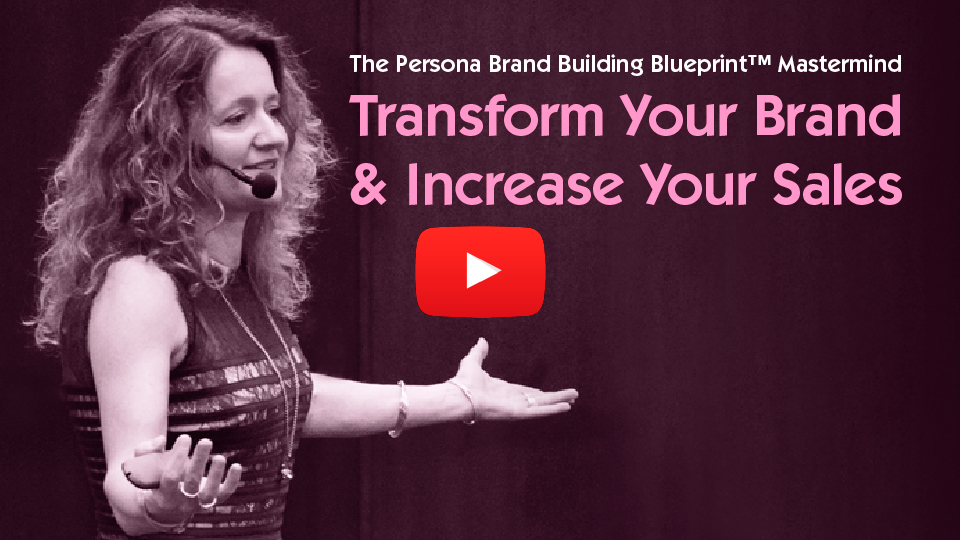
Build your highly likeable, standout brand in the Persona Brand Building Blueprint™ Mastermind with Lorraine Carter
Want to discover more about building your standout, №1 powerhouse, highly visible, profitable brand?
- Schedule an appointment — we can meet in person or online
- Allow us to create a customised plan for you
- Let’s implement the plan together
- Get in touch [email protected] or ring +353 1 8322724
For brands that are willing to embark on the brand transformation journey, but want a self-help solution, take a look at the Personality Profile Performer™ Programme here. It’s a step-by-step process empowering you to build your highly recognised brand so you can grow your business and increase your profits.
Questions to Consider in Your Brand Strategy
- Look at your current brand messages and assess what psychological principles you currently use? How can you improve your brand strategy now that you know about the psychological principles?
- What are top 3 principles that are most applicable to your business and your brand strategy?
- How can you improve your brand messaging, visual imagery, video, music, website design using the sensual psychological principles in brand strategy outlined above?
- What emotions does your brand evoke? Can you link those emotions to psychological associations so you make your brand strategy more effective?
Your Client Satisfaction Guarantee
- When you work with us we’ll create a customised brand building plan and strategy with clear investment for you tailored to your specific requirements and preferences
- You’ll know each step of your brand building journey before we start because we’ll discuss it, document it and agree on it with you before work commences
- You’ll have timelines, key milestones and deliverables to evaluate and approve for each stage and part of your brand building process
- Because we know the unexpected sometimes happens we can make adjustments along the way if you need it and if something extra is requested we’ll ensure you’re fully appraised about what that entails before committing
- As we achieve pre-agreed objectives you’ll be able to evaluate your brand building work and strategy in progress, coupled with the outcomes to ensure return on investment
Get in touch today because we’d love to get started helping you build your standout, powerhouse brand so you can increase your performance and leave your competitors way behind. Email us [email protected] or ring us +35318322724 (GMT 9:00-17:30).
[1] https://www.psychologytoday.com/blog/unconscious-branding/201306/how-marketers-manipulate-you-without-your-knowing
[2] https://amzn.to/15WVDpA
[3] https://www.amazon.com/Pre-Suasion-Revolutionary-Way-Influence-Persuade-ebook/dp/B01C36E2YS
[4] http://www.richardgregory.org/papers/knowl_illusion/knowledge-in-perception.htm
[5] https://www8.gsb.columbia.edu/rtfiles/cebiz/mandel_johnson.pdf
[6] http://www.creativebloq.com/news/10-iconic-logos-hilariously-drawn-from-memory
[7] http://affect.media.mit.edu/pdfs/05.larson-picard.pdf
[8] http://onlinelibrary.wiley.com/doi/10.1111/j.2044-8295.2011.02072.x/epdf?referrer_access_token=aEJmWl2tKLOwQkPw0nHAU4ta6bR2k8jH0KrdpFOxC67q6VVlm-qVOlYhTqfg78VrjtEzjoK86Rvn7Bge8zW2MvepaWr7rkeC06CYc7AFdSen2BCHL1oxIzpSZBNsDyvEUwQRC-NCa1YrZtWlK6d7BXD2mjd9bznmFAtZgj1rasom4UHdrdvI47tMRVXRbhpVDwMfDBnpJ126FO00x8PjNL79xGRSKjWh9pP0kZH7ZKlc6qQi_s3DaEY6_g7fh00Cg8K70Zeibanprz0DpEPr-g%3D%3D
About
Persona Branding & Design Consultants
Contact: Lorraine Carter
T: +353 1 832 2724
Carra House
Howth, Co. Dublin, Ireland
Copyright © 2007-2022 All rights reserved.
Persona Design Consultants Ltd.
Registered in Ireland: No. 201997
Member of





